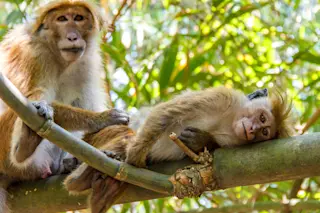Toque macaque monkeys grooming at the Royal Botanical Gardens, Peradeniya, Sri Lanka. (Credit: Viacheslav Misiurin/Shutterstock) Some 45,000 years ago, the tropical rainforests of Sri Lanka teemed with dangerous plants and lacked big game, yet people made a life there. Our key to success in that seemingly inhospitable region? It was monkeys and squirrels, researchers say — or rather, our ability to catch them. “These animals are difficult to catch and suggest a certain level of sophistication in terms of hunting strategies,” said Patrick Roberts, an archaeologist at the Max Planck Institute for the Science of Human History in Jena, Germany, who led the new research. The discovery suggests humans had the capacity to quickly adapt to unfamiliar environments. This knack for adaptation may be what enabled people to expand across the planet, the researchers say.
Some researchers argue that as humans dispersed out of Africa, our ancestors tended to stick ...














